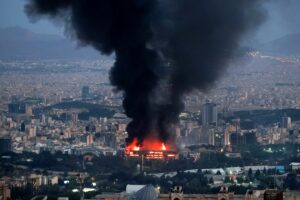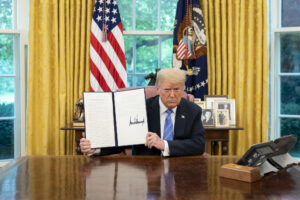For Poland, Europe and the world, this is a huge relief. With this very clear victory for the opposition, the Poles have escaped the constant erosion of the rule of law, press freedom and women’s rights that the outgoing majority had imposed on them. The European Union, for its part, is seeing the end of the dangers that the assertion of a Hungarian-Polish-Slovak coalition would have posed for its functioning, its decision-making and the clarity of its support for Ukraine.
As for international stability, the Poles have just spared it the uncertainties that would have arisen if the 27 had wavered at a time when we cannot, with confidence, think to ourselves that none of the countries in the Middle East wishes to see a regional conflagration.
It is true that Saudi Arabia and its crown prince only dream of opening up to the West and are not keen on the Palestinian cause. Faced with a deep economic decline and growing popular discontent, Marshal-President Sissi would have no interest in breaking the cold peace between Cairo and the Israelis. The Syrian regime does not have a penny to its name and does not even dare to tackle the protests in the south of the country. The stability of the Jordanian kingdom has long depended on coexistence with Israel. Iran would have nothing to gain by entering into open conflict with the “Zionist entity”, even if it were to do so through the Lebanese Hezbollah, at a time when it is unable to normalise its domestic situation and when the spiral of violence caused by the mass killings by Hamas has already brought the rapprochement between Riyadh and Jerusalem to the halt Iran desired.
If logic alone governed the atrocity of this crisis, a return to the status quo ante would not be unthinkable, but the bombing of Gaza followed by a sweep of this coastal strip could quickly force the Arab capitals to raise their voices under pressure from their public opinion. Fearing of losing their status as defenders of the Palestinians and therefore their moral legitimacy in Sunni lands, the Iranian Shiites could end up having to help Gaza by letting Hezbollah open up a second front in the north. In short, all it would take is one more slip-up by Hamas or Israel to set this powder keg that is the Middle East ablaze.
And then there is Russia. Mr Netanyahu thought he could count on his friend Putin, but the Russian President would actually have a great interest in contributing to a regional conflagration. To date, there is no evidence that he has favoured Hamas’s plans. There is no “smoking gun” and probably none will be found, but it is above all the Kremlin that is benefiting from the crime since it is going to become not impossible but difficult for the United States and the European Union to support both Ukraine and Israel at a time when the American presidential campaign is opening in Donald Trump’s shadow; when the European Union is divided by the Palestinian question and when the President of the Commission has just made a very damaging blunder by appearing to approve the bombing of Gaza.
Putin cannot ignore these Western weaknesses. He will do all he can to continue to play on them, at a time when the maps of the world’s divisions over Gaza and Ukraine overlap almost completely. This crisis has the potential to drive a wedge between the West and the ‘Deep South’. The bombings in Gaza now have every reason to accentuate it, and if China were to decide to use this imbroglio to launch “a coup de force” against Taiwan, we would be facing the beginnings of a generalised conflict.
In other words, there is an urgent need to remind the Israeli government that revenge is not a policy, that a political representation of the Palestinians must be preserved, that there is no political representation other than that of the Palestinian Authority and that the inevitable corollary of the political eradication of Hamas is a resumption of peace negotiations.
Europe must make this clear by making the continuation of its aid to the Israelis and Palestinians conditional on reciprocal compromises leading to a two-state solution. As a driving force at least for a change in the situation, the European Union now has a role to play that the United States cannot because the start of its presidential campaign has polarised and paralysed it.
It will take another two months or so for the new majority to take the reins in Warsaw. Even then, nothing will be simple, but if they had voted in the opposite direction to the one they have just cast, the Poles could have set back their country, Europe and the world in a single stroke.



